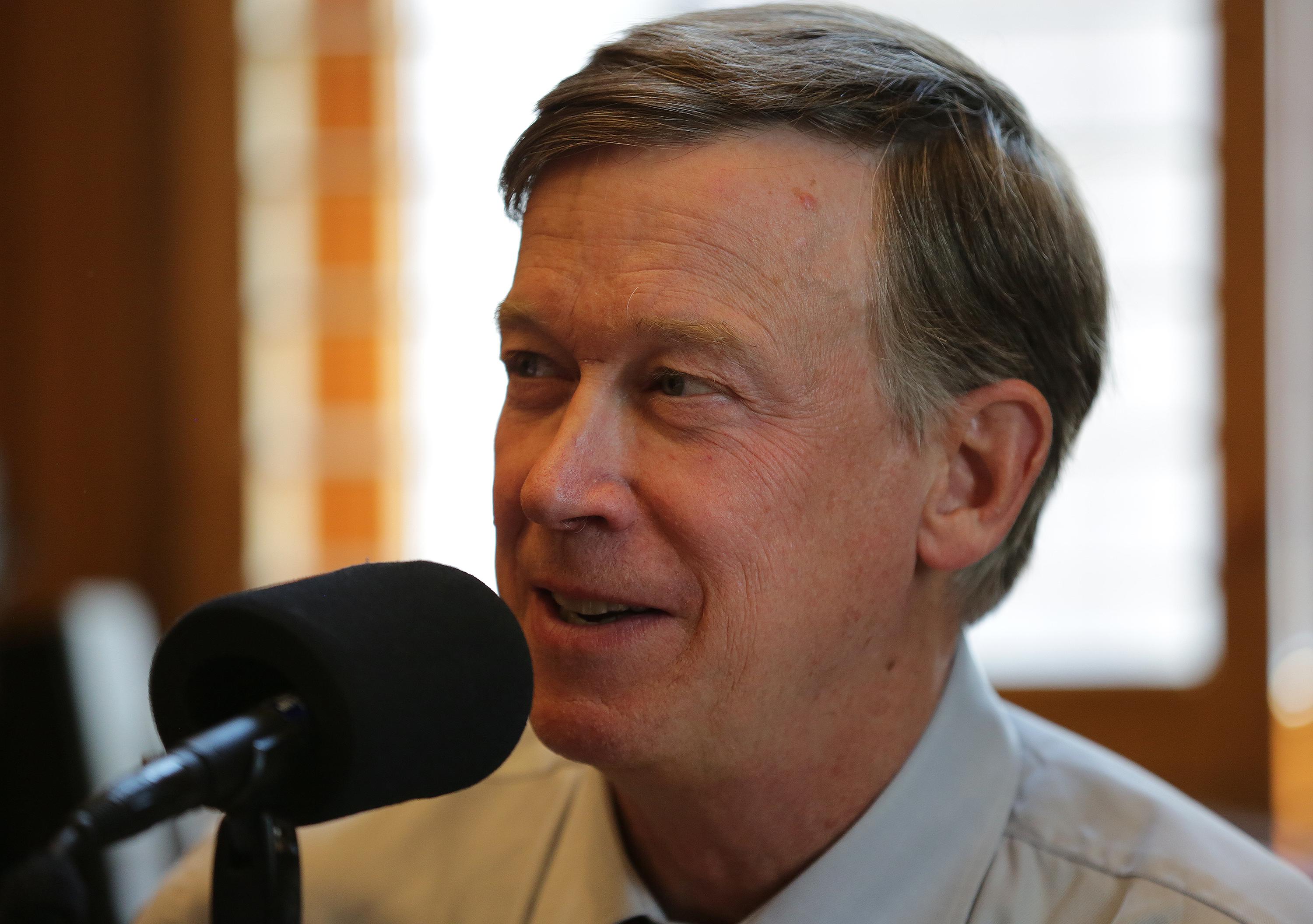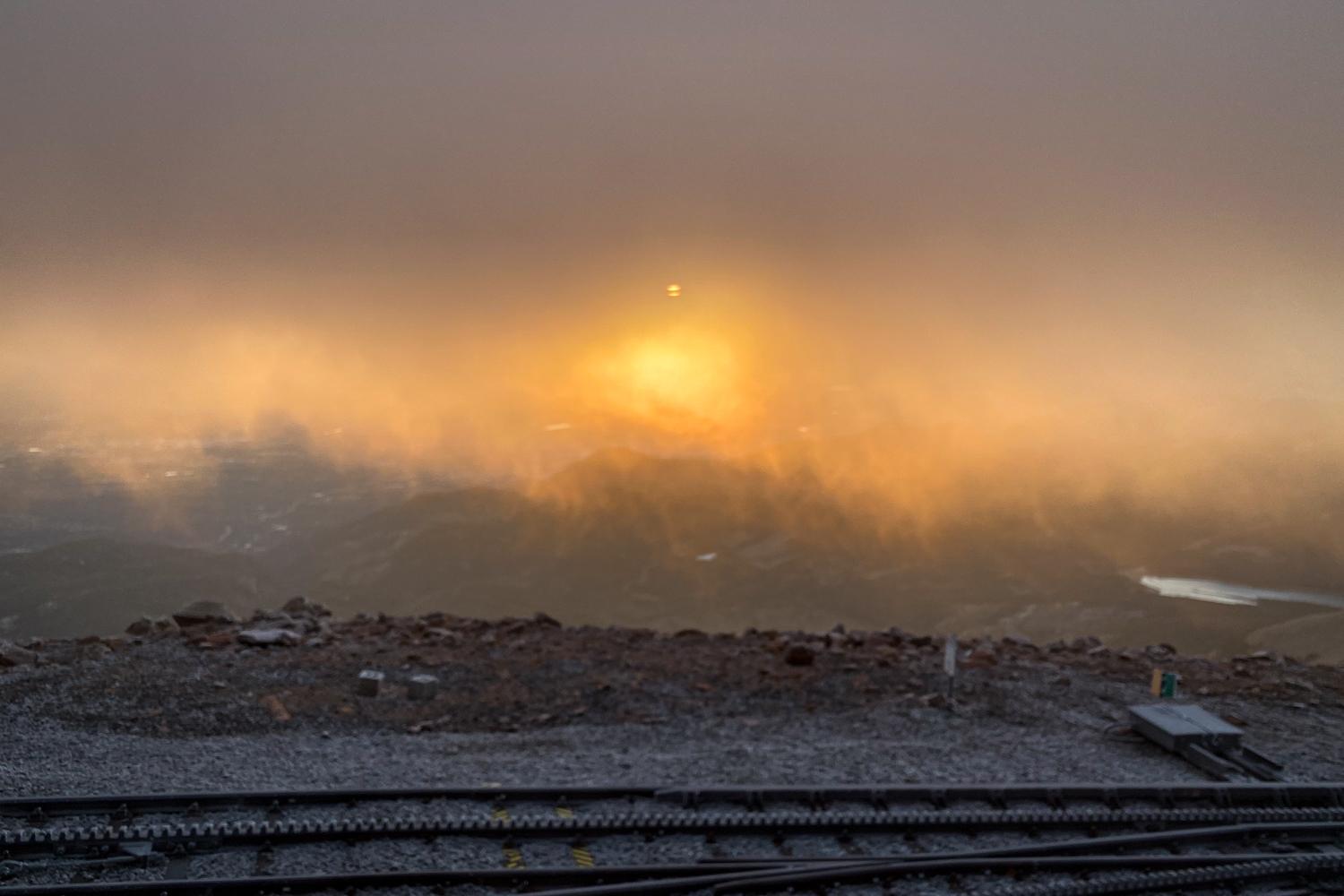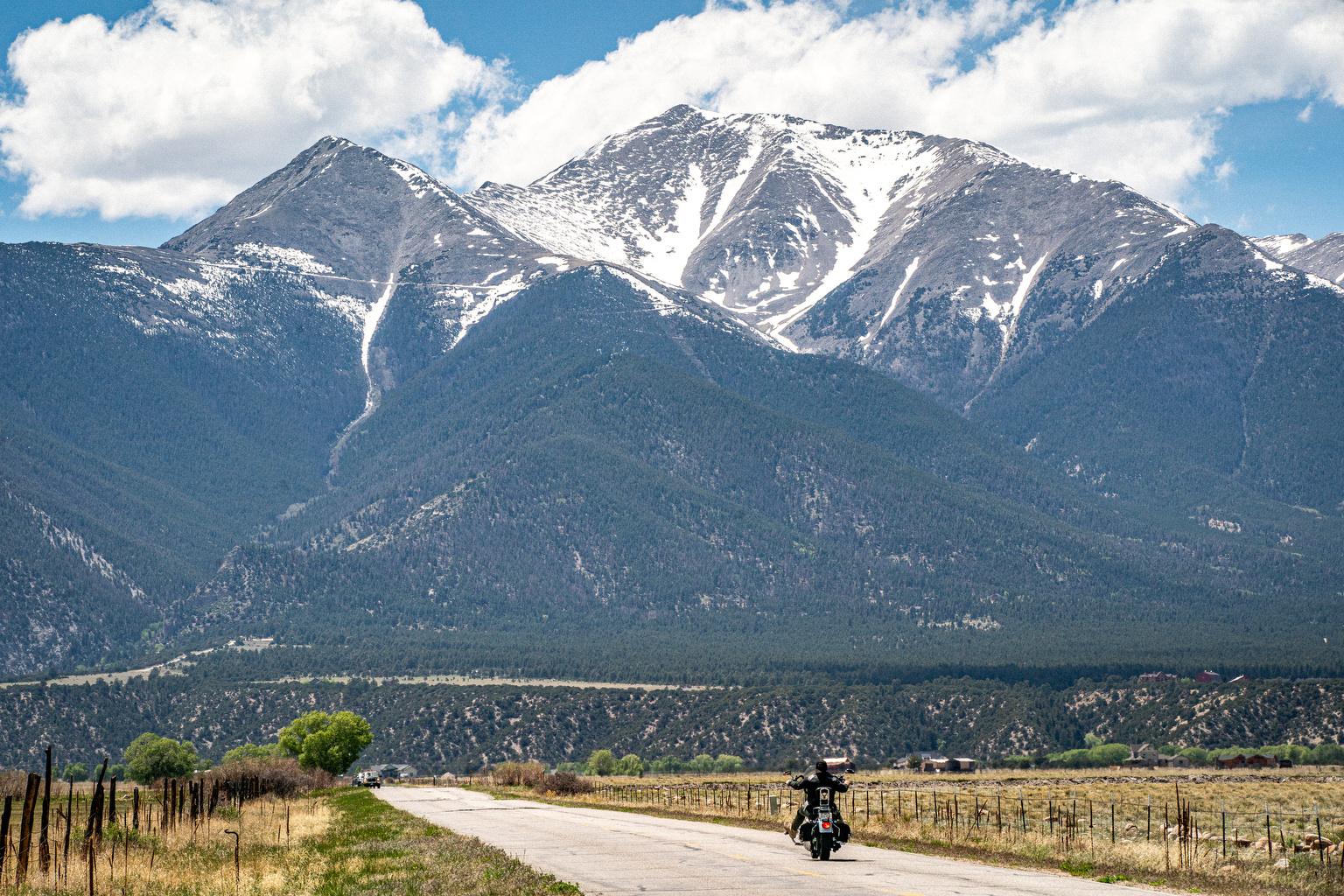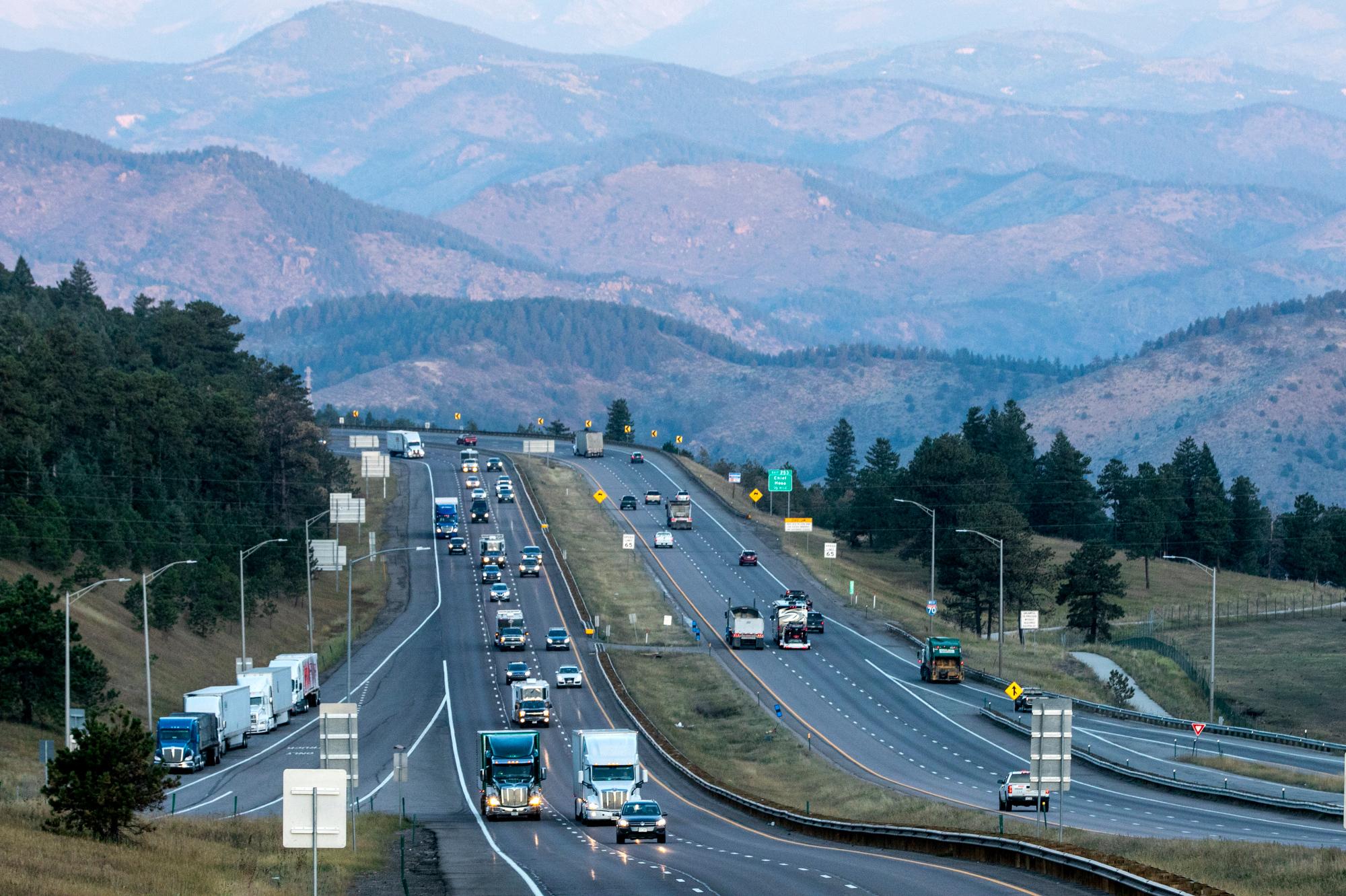

Colorado Gov. John Hickenlooper said earlier this year he has kept a list at his bedside of what a Donald Trump administration could mean for Colorado.
That list took on new meaning after Trump was elected president, and on Monday, Hickenlooper discussed what the state faces in terms of changes to its health care, immigration, and energy policies under the new administration.
"Let's go slowly and carefully as we look at making these significant changes to our nation's policies," he said.
Hickenlooper on his commitment to clean energy development:
"I think we should certainly continue to pursue [a 35 percent reduction in greenhouse gas emissions statewide] if we can do it and not affect people's electrical bills... Even under a Trump administration, I think we want to have, and to be honest I think if Donald Trump was sitting here beside me he'd agree with this, if for the same cost we can deliver cleaner air, why wouldn't we do it?"
On the prospects for Colorado's coal industry are under Trump:
"The real reason coal has gone downhill so dramatically is how rapidly the price has gone down on natural gas, and how rapidly the price has gone down on wind. Those two things have put coal at a dramatic disadvantage... I think it's a steep hill to get coal jobs back."
On a Trump advisor's recent comment that the administration would like to "open up more of our federal lands for oil and gas development":
"[Colorado doesn't] have lands, we don't have many lands that are presently excluded that could be opened up... We're not going to see a lot of change in Colorado. There are, perhaps, other parts of the American West where more land that has higher potential will be opened up. The bottom line is I don't think there's very much of it... [Former President] George W Bush thought he was going to see huge windfalls from these types of lease revenues, and it really never materialized."
On Hickenlooper's promise last week that "immigrant roundups" won't happen in Colorado, no matter what efforts the Trump administration makes:
"We've heard, and continue to hear, one story after another about how nervous people are, and not just people that are here without papers, but all kinds of people feel threatened by a lot of what they heard in the Trump campaign... And I can't believe that's what he really meant that's what he's going to do... There's so much fear about this, I thought it's important to say, 'Hey, this isn't going to happen.'"
On the future of Colorado's Medicaid program and the health insurance exchange based on the Affordable Care Act:
"That we don't know yet... Are they going to get rid of all the local exchanges after we put so much work into getting them going?... I have no answer, and I don't think anyone knows... I come from the school that health care should be a right, not just a privilege. And we can argue about the level of health care... I'm happy to have an alternative [to Medicaid]."
On Trump's promise of a large infrastructure spending package:
"He's talking about tax credits, which generally suggests that federal participation in this kind of infrastructure would be quite small. So he's not saying the federal government's going to spend $550 billion or $1 trillion... So he's talking about more tollways, I mean most likely more tollways, more public-private partnerships, which I'm open to. We need so much more infrastructure in this country that I'm not turning my back on any suggestion."
Read the transcript:
Ryan Warner: This is Colorado Matters from CPR News. I’m Ryan Warner. Colorado Governor John Hickenlooper says he’s been keeping a list at his bedside of what a Donald Trump Administration could mean for Colorado. He revealed that to us before the election. That list, of course, takes on new meaning now. I spoke with the governor at the state capitol Monday for our first interview since Trump became President-elect and I asked him if he landed on Trump’s calendar what would he say to him? Governor John Hickenlooper: Well, I think that my message is being delivered by all kinds of people right now and that is let’s go slowly and carefully as we look at making these significant changes to our nation’s policies. RW: And yet didn’t he win in many ways on not going it slowly but making dramatic changes that spoke to voters? JH: I think it’s fair to argue that many of those people that voted for him weren’t really voting for him they were voting against Hillary Clinton, for whatever reason rightly or wrongly. The number, I think he got 47 percent of the vote and legitimately the number of the percentage of people that really strongly in going fast would probably be closer to 35 percent. So is that a mandate? I don’t think so. RW: What policy area would most concern you going fast? JH: There’s so many to choose from. I see healthcare. I think just immediately, I mean, legally they can’t throw out all the Affordable Care Act on a whim, but they’ve said they’re going to take it basically just dismantle immediately. There are hundreds of thousands, millions of people that have preexisting conditions and now have insurance otherwise wouldn’t. Each state or not each state, but every state has had to a varying degree challenges and benefits of implementing or expanding healthcare coverage. We’ve seen across the nation during the campaign no one would really – the media wouldn’t pick this up but if you go in the last five years and average what the increase is every year as a percentage has been of insurance costs for those people getting insurance through their businesses are is healthcare connected to their workplace. RW: That is not Obamacare. JH: That is not Obamacare, exactly, totally independent and yet the rate of increase there for the last five years has been the lowest it’s been in recorded history, right, in the last fifty years. So what happened was a lot of the uncompensated care hospitals, Obamacare helped expand that. They digitized everyone so they could begin keeping medical records on databases instead of on paper. That has allowed significant savings in many arenas. Now there has been more up and down of the specifics like the exchanges but that’s a relatively teeny number of people. Anyway, the point I’m trying to make is the whole system is affected by the decisions. So the rate of people’s insurance that they get at work could easily be going up more rapidly if Obamacare is changed in ways that aren’t thoughtful. RW: I’ll say that the Republicans are interesting in keeping the preexisting conditions portion of the Affordable Care Act it would seem. JH: Yeah, I expect that they’ll be other places that they’re going to try and keep parts of it as well. RW: Are there conversations going on in the administration about the future of Colorado’s insurance marketplace? What is the future of the exchange? JH: Well, that we don’t know yet. Again, that’s a classic case is are they going to get rid of all the local exchanges after we put so much work into getting them going? Are they going to keep the national exchange if they get rid of the local ones? These are – I have no answer because I have no data and I don’t think anyone knows. RW: I want to say it’s open enrollment on the exchange and the state’s exchange says demand is high, plans bought now will be honored through 2017 according to the Washington Post. Another part of Obamacare was not just getting private insurance for more people, more Coloradans, but also expanding Medicaid. And many Republicans in Congress, including the Speaker of the House, want to change Medicaid, which is the health program for the poor by block-granting it. Basically, the Feds give money to the states to run the program more or less as they see fit and states need to come up with extra cash if the federal money doesn’t cover the cost. People on Medicaid now could decide to buy what Republicans say will be cheaper plans into this new regime but Colorado has had a pretty generous Medicaid expansion, one in about five Coloradans is on Medicaid. Would the state try to keep all those people on Medicaid if the Republican Congress wanted to roll back how much the Federal Government spends on it? JH: Well, I come from the school that healthcare should be a right, not just a privilege and that we can argue about the level of healthcare and my feeling is that people should have a basic level. Not everyone should get a new hip if their hip’s sore immediately. There should be an evaluation process that if people are having private healthcare insurance they’re obviously going to get more. They’re probably going to get shorter wait times, all kinds of benefits. That being said if there’s a block-grant is it going to be a flat thread that stays with no inflation even as healthcare costs continue to rise? What about the cyclicity so if you go into a recession sometimes you’re going to see the number of people that have their own healthcare is going to go down dramatically and the need for Medicaid would go up. That being said we will try to keep as many people insured as possible. I think it’s very hard to go… RW: Not necessarily on Medicaid you're saying. JH: On anything. On the private exchanges, but on Medicaid, on everything. RW: But philosophically would you try to maintain the Medicaid roles to the best of your ability as governor or does it matter less to you that it’s Medicaid if there’s an alternative private plan for the indigent? JH: Right, less, it matters less. I'm happy to have an alternative plan and I think that just because people are from a lower income family doesn’t mean they shouldn’t have choices if we could – if it’s possible to provide them choices. RW: On immigration you reassured a crowd in Alamosa last week that if the federal government tried to round up immigrants in the country illegally, you wouldn’t let that happen in Colorado. Why did you feel the need to talk about that then and there? JH: Well, we’ve heard and continue to hear one story after another about how nervous people are. I mean, and not just the people that are here without papers but all kinds of people feel threatened by a lot of what they heard in the Trump campaign and I just – Trump, during the campaign, said if he got elected he would put together a deportation team and they would remove the eleven million people that are estimated to be here illegally in rapid order. I don’t think he’s obviously backing away from that, I think, and I can’t believe that he really meant that’s what he was going to do. The ends to him justify the means so it doesn’t matter whether he really intends to do something; if it was useful in the campaign he was willing to say it. I’d hope that’s the case because, I mean, the estimate's up as high as $300 billion to do that and the destruction to our economy and to our communities would be staggering. I mean, tearing families apart. So there is so much fear about this I thought on it and I think now it’s important to say, “Hey, this isn’t going to happen.” And it’s not a question of being sanctuary cities. RW: Well it is because Denver and Aurora might face some penalties if they hold on to that distinction. JH: Well the Supreme Court’s been pretty clear about the federal government is – it’s very difficult for them to withhold transportation money or education money because you don’t conform to a policy. U.S. versus Prince was the case in terms of the federal government cannot commandeer state resources to carry out federal policy. The person who wrote that opinion was Justice Scalia and this is a clear state's rights issue that the federal government can’t come in and say, “You, local police, have to do this because we’re telling you to because it’s the law. You have to enforce this federal law.” It’s the federal government’s job to enforce that law. RW: Well, and let me – on that point why wade into what is potentially dangerous territory, I mean, do you think as a matter of course that governors should outwardly contradict the federal government on an issue that’s really under federal purview, I mean, enforcing the country’s immigration laws? JH: That’s what I said. I’m happy – look at what the federal government’s been doing, right? President Obama deported 2.5 million undocumented immigrants, right, people that didn’t have right papers that were here illegally and they were for the vast majority a serious threat to our communities. If the federal government’s going to continue what Barack Obama was already doing which is removing violent criminals from our communities who do not have the legal right to be in this country, we’re supporting them, a hundred percent that’s what we’ve been doing. What I was responding to was the fear in our community there are a million – a million other priorities we have in this country that we should – I think would be more rightly focused on. And I think that long term the people that have been in for years, have been paying taxes, obeying the law we need to find some way – they’ve got families here, they own real estate here. Many of them are intimate parts of the community. We should try and find some way that they can legally stay, at least, get some sort of a green card or a temporary legal rights so that they’re here legally. RW: You’re listening to Colorado Matters. I’m Ryan Warner and we’re back at the state capital for our regular conversation with Democratic Governor of Colorado, John Hickenlooper. President-elect Trump spoke highly of legacy energy sources including coal during the campaign and spoke poorly of renewable sources like solar and wind. One of the first things he wants to do is reverse President Obama’s executive orders including one on energy. If the Clean Power Plan goes away, do you proclaim as clearly as you did there on immigration, no, Colorado is a renewable energy state? JH: Well, and if you remember, Ryan, when we discussed the Clean Power Plan before I said that our efforts around energy in Colorado are not a result of that plan, right? We are at a mile high, we have thinner air. Pollution of our air is much more harmful to us in this altitude than anywhere else so if there are ways that we can reduce pollution, ozone particulates, everything and yet still protect our consumers, both businesses and residents, I think we should do it. RW: Independent of the federal government, which may or may not be backing it under a Trump Administration? JH: Right, but we didn’t need them to back it before, right? If we can do it for the same cost, don’t we owe it to our citizens to give them the cleanest air to breathe that we possibly can. RW: So what about that draft executive order you floated last summer which calls for a 35 percent reduction in greenhouse gasses emissions by 2030? Would you keep pursuing that knowing that Colorado probably won’t get any more mandates like that from the Federal Government? JH: Oh, I think we should certainly continue to pursue that 35 percent number if we can do it and not affect people’s electrical bills. RW: So that’s still on the table, even under a Trump Administration? JH: Absolutely, even under a Trump Administration, I think we want to have the – and to be honest, I think if Donald Trump was sitting here beside me he’d agree with this, if for the same cost we can deliver cleaner air, why wouldn’t we do it? It’s a simple business proposition. RW: Any sense of a timeline for pursuing that executive order? JH: Well, I’m not sure whether we’re going to do an executive order or lay it out in an op-ed. We’re trying to figure out what the right format is. RW: Might it be legislation in the coming sessions? JH: Certainly to get that level we would need legislation of one place or another and I think Republicans and Democrats, pretty much all the Republicans I’ve talked to agree that we want to have clean air. RW: True but do not necessarily agree about this 35 percent reduction executive order. JH: Well, but that’s because we haven’t had a chance to sit down and look at how would we get there and how can we do it in a way that doesn’t cost us more money. RW: Along those lines, some in coal-rich parts of Colorado want to know if you’d go along with President-elect Trump if he tries to re-invigorate that industry, State Senator Jerry Sonnenberg who’s part of the state senate leadership was quoted in the Colorado Independent as asking you "If this country wants to continue utilizing coal, if it’s cost effective, will we be allowed to?" JH: Of course, I think that’s what we said from the beginning. And Senator Sonnenberg, who I think, is one of the most elegant at representing rural issues, right now what’s really been the biggest challenge for coal is the fact that natural gas in an open market knocks them out of the water and is much – it’s half the pollution. RW: Well, I think that’s why, certainly, environmentalists hearing you say, "Of course," would respond, “How the heck is he going to support coal if he just talked to me about clean energy?” And, of course, I imagine that those in coal communities will be celebrating that answer. JH: Yeah, but it’s not going to happen, right, in other what you asked me was can they do it on an equal footing, right? And right now you can’t have us cleaning the atmosphere burning coal. We don’t have the scrubbers yet and, certainly, there’s – I think, a President Trump is going to invest more money in trying to make coal cleaner. But right now it is so dirty and it’s more expensive, right. If you’re putting a new plant together to burn coal, a new plant to burn natural gas, the natural gas plant’s going to have cheaper electricity. The real reason coal has gone downhill so dramatically is how rapidly the price has gone down on natural gas and how rapidly the price has gone down on wind. Those two things have put coal had a tremendous disadvantage. RW: Do I essentially hear you saying to coal country in Colorado, getting coal jobs back is just not realistic? That was a false promise from this candidate. JH: I think that it’s a steep hill to get coal jobs back. I do think that we are all committed to trying to figure how do we get more broadband into coal country and how do we make sure that we provide incentives for small businesses or entrepreneurs to locate their businesses there to replace that industry that right now is at such a competitive disadvantage. But just right now, given the conditions we see, it’s hard to see how coal’s going to get a lot more jobs back to it. Again, it takes a lot of labor to get the coal out and then natural gas comes out so un-expensively and so much cleaner. RW: Then there’s oil and gas drilling. This is a top economic advisor to President-elect Trump on NPR last week. “We think we can raise significant amounts of revenues for the federal government by opening up more of our federal lands for leases, for oil and gas development and coal development. The energy companies will actually pay the federal government to be allowed to drill and mine on some of these lands. We’re not talking about environmentally sensitive lands but lands that just have been taken off of grid.” Is there a land in Colorado that fits that bill? JH: Well, what’s environmentally sensitive and what’s not is a sticky wicket and hard to define. We don’t have lands that are presently – we don't have many lands that are presently excluded that could be opened up. RW: So you’re saying that you don’t think there’s a lot to tap there? JH: Yeah, we’re not going to have – see a lot of change in Colorado. There are perhaps other parts of the American West where more land that has higher potential will be opened up, the bottom line is – RW: Do you think that should happen? JH: Well, the bottom line’s I don’t think there’s very much of it and I don’t think it’s going to have a significant – I mean, look at the models and look at the revenue. George W. Bush thought he was going to see huge windfalls from these kinds of lease revenues and it really never materialized. RW: What do you think is the greatest opportunity for Colorado under a Trump presidency? JH: Well, I think that I am always concerned about the economy and business and certainly President Trump, President-elect Trump, has made a commitment to make that a priority and to do everything he can. I obviously, like many people, worry about getting rid of all our trade agreements or – RW: Or renegotiating them. JH: Well, but some of them he said he would get rid of immediately on Day One. In each of these cases often I think there is some benefit that can be gotten from renegotiating agreements of all kinds of sorts but, I mean, you don’t want to throw the baby with the bathwater. I think that’s the thing that most people worry about is are they going to go so fast, is there really going to be a surgeon’s approach to making sure we’re getting benefit and not doing harm. RW: Trump also wants to improve a giant infrastructure package. The details of that are sketchy, it could be a trillion dollars, it could be $550 billion. In any case I’d like to know what would be on your wish list? I mean you talk to me about transportation funding based on the need all the time. JH: Well, obviously a large infrastructure program would be warmly received by almost every state. The devil’s in the details so he’s talking about some tax credits which generally suggest that the federal participation in this kind of infrastructure would be quite small so he’s not saying the federal government is going to spend $550 billion dollars or a trillion dollars, he’s saying that that’s how much infrastructural be addressed. So he’s talking about more tollways, I mean, most likely more tollways, more public-private partnerships which I’m open to. We need so much more infrastructure in this country that I’m not turning my back on any suggestion. RW: Is it important that some of that be spent on transit to you? JH: Yeah, absolutely. I think long-term, transit is the ultimate solution to being able to have a continued economic growth without strangling and I think part of the reason Colorado’s done so well and metro-Denver’s done so well – when metro-Denver put in FasTracks it meant we had a decided advantage in attracting talented young millennials that Nashville and Austin just don’t have. RW: So you’d want to see money spent there for sure? JH: It would have to be. RW: Well, let’s talk about the state’s efforts to ease tensions between the oil and gas producers and the communities where they drill. Those efforts are being tested right now in northern Colorado. On Friday a neighborhood group announced it’s suing the state. It alleges the state isn’t following its own rules to look at alternatives before drilling close to homes and businesses. Have you followed the situation in Triple Creek and are you concerned about the way the state is dealing with situations like this now after your oil and gas task force tried to make these negotiations more inclusive, I mean, here we have a lawsuit? JH: I have followed this one quite closely. I actually was, at an event about three or four weeks ago one of the local folks gave me an envelope with a description of what their complaints were and what they thought should be done and – RW: They’re really concerned about a lot of truck traffic. JH: Truck traffic. They want to see why there’s not a pipeline there. They want to make sure how come the tanks aren’t buried. All that went through the process and I think, obviously we’re going to go back and review it and a court will decide. Our understanding is that the process was followed carefully and got a certain level of results but not enough results to satisfy the local community members. RW: The lawsuit estimates the trucks will make more than a hundred thousand trips on this road over a 27 and half year period. So what you’re saying is you’ll see them in court, I guess? JH: Yeah. No, not that we'll see them in court. That puts a tone on it that I would never ever use. I mean, I was in private business for 20 years and I was never in court. I never sued anyone, never was sued and we try to do everything we can to avoid litigation in these kinds of things. RW: On Triple Creek you’re confident this state has followed its own rules but given a lawsuit’s been filed how do you feel about the new rules? Are they working? JH: Well, one lawsuit doesn’t mean the thing’s a failure so – RW: Well, it’s early. JH: It is early. I think we want to sit down and look at it, walk through it and see if there’s not some way – oftentimes when you get into court there’s an opportunity to sit down and try to continue to resolve what you’re disagreement is and your issues are. RW: Could that have an effect on the rules then? JH: Well, you’d have to go and change rules and anytime you change rules it’s a long process so I don’t think you’d have the direct effect, but if there’s a better way of doing things that is able to create an easier path to compromise we’re all for it. RW: Thanks for being with us. JH: Always a pleasure. |









